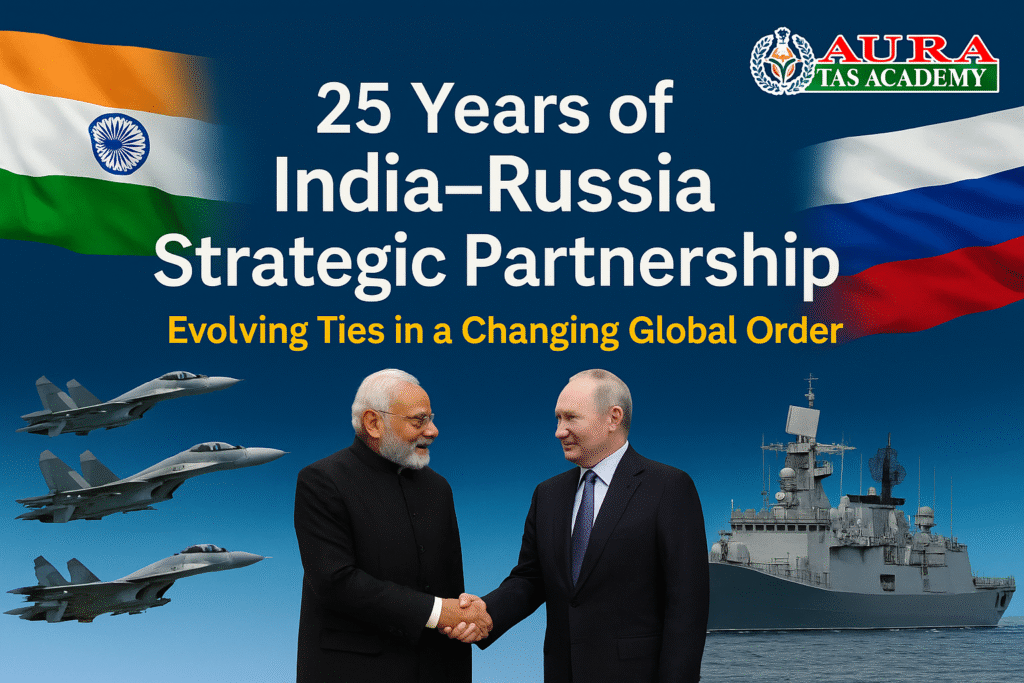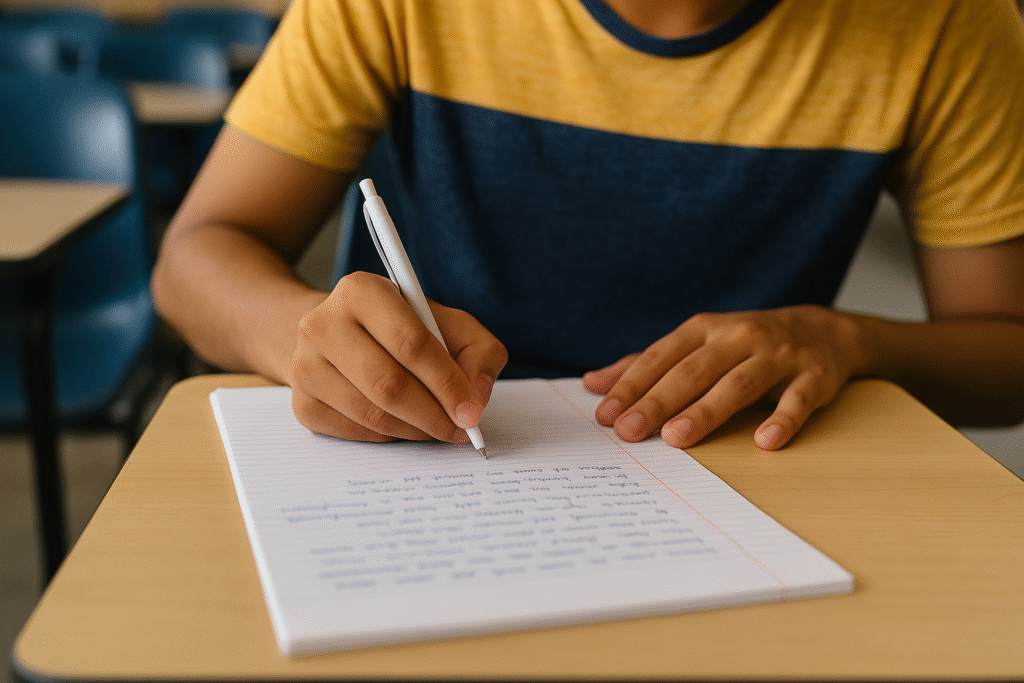25 Years of India–Russia Strategic Partnership – Evolving Ties in a Changing Global Order

In 2025, India and Russia mark 25 years of their Strategic Partnership, a relationship that has stood the test of time, adapting to changing global geopolitics.
The partnership, which began with the signing of the “Declaration on the India–Russia Strategic Partnership” in October 2000, has expanded across defense, nuclear energy, space cooperation, trade, and regional security.
For UPSC aspirants, this topic holds immense relevance under GS Paper 2 (International Relations) and GS Paper 3 (Defence Technology and Energy Security).
Historical Context
The India–Russia (formerly India–Soviet) relationship has been one of trust, mutual respect, and strategic alignment since the Cold War era.
Key milestones include:
1971: Indo-Soviet Treaty of Peace, Friendship, and Cooperation.
1993: Treaty of Friendship and Cooperation post-USSR disintegration.
2000: Strategic Partnership Agreement under PM Atal Bihari Vajpayee and President Vladimir Putin.
2010: Elevated to a “Special and Privileged Strategic Partnership.”
Over the years, Russia has remained a dependable defense and energy partner, while India has emerged as a key Asian economic and geopolitical power.
Key Pillars of the Partnership
🛡️ 1. Defense and Security Cooperation
Over 60% of India’s defense inventory is of Russian origin.
Joint projects include BrahMos Missile, S-400 Triumf Air Defence System, and AK-203 Rifles.
Regular joint military exercises like INDRA and AVIAINDRA strengthen interoperability.
⚛️ 2. Nuclear Energy and Space Collaboration
Kudankulam Nuclear Power Plant is a hallmark of India–Russia cooperation in peaceful nuclear energy.
Space partnership continues under ISRO–ROSCOSMOS collaboration in navigation, satellite technology, and the Gaganyaan Mission.
💰 3. Trade and Economic Engagement
Bilateral trade crossed USD 65 billion in 2024–25, driven by energy imports, fertilizers, and defense equipment.
The two countries are exploring rupee–ruble trade mechanisms to bypass sanctions and promote local currencies.
🌏 4. Energy Cooperation
India imports crude oil, LNG, and coal from Russia at discounted rates.
Collaboration in the Sakhalin oil fields and Arctic energy exploration ensures India’s long-term energy security.
🕊️ 5. Multilateral and Regional Cooperation
Both nations coordinate closely within platforms such as BRICS, SCO (Shanghai Cooperation Organisation), G20, and the UN.
Shared vision for a multipolar world order and reformed multilateralism drives their diplomatic synergy.
Recent Developments (2024–2025)
India maintained a balanced stance on the Ukraine conflict, calling for dialogue and diplomacy.
Russia supported India’s initiatives at BRICS 2025 and backed its UN Security Council reforms proposal.
Launch of the India–Russia Eastern Maritime Corridor (Vladivostok–Chennai Route) to enhance connectivity and logistics.
Strengthening cooperation in Arctic research, AI, cybersecurity, and energy diversification.
Challenges in the Partnership
⚠️ 1. Russia’s growing proximity to China has created strategic unease for India.
⚠️ 2. India’s increasing engagement with the West (QUAD, I2U2) challenges traditional equations.
⚠️ 3. Sanctions on Russia affect trade and financial mechanisms.
⚠️ 4. Technological dependency in defense imports remains a concern.
Despite these challenges, both nations emphasize “strategic autonomy” and mutual respect as the foundation of their relationship.
India–Russia Partnership and the Changing Global Order
In a world shifting toward multipolarity, India and Russia find common ground in promoting:
🌐 Strategic independence from Western blocs.
🕊️ Stability in Eurasia and the Indo-Pacific.
⚡ Energy and technological sovereignty.
📈 A fair global trade and financial system.
This long-standing partnership continues to evolve — not as an alliance, but as a strategic convergence of interests.
UPSC Relevance
GS Paper 2: Bilateral Relations, International Groupings, India’s Foreign Policy
GS Paper 3: Defence Technology, Energy Security
Essay Paper: “Strategic Partnerships and India’s Role in Global Power Shifts”
💡 UPSC Mains Question Example:
“India–Russia relations have transitioned from a military-dependent partnership to a strategic convergence of global interests. Discuss.”
Conclusion
As India and Russia celebrate 25 years of their Strategic Partnership, their relationship continues to adapt to the new realities of global politics.
What binds the two is not just history — it is trust, resilience, and a shared vision of sovereignty and multipolarity.
While challenges persist, the partnership remains an enduring pillar of India’s foreign policy, rooted in mutual respect and strategic balance.
📘 For UPSC Aspirants – Recommended Reading
Aura IAS – International Relations PYQs (2013–2025)
✔️ Topic-wise questions on India–Russia, India–US, and India–China relations
✔️ Model answers with geopolitical insights
🛒 Explore Here:
👉 https://auraias.in/shop/



